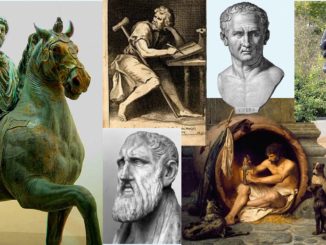
Book Reviews: Greco-Roman Stoic and Cynic Philosophers, and Epicurus
These quick book reviews include links to our YouTube videos and blogs on the Stoic and Greco-Roman philosophers. […]

These quick book reviews include links to our YouTube videos and blogs on the Stoic and Greco-Roman philosophers. […]
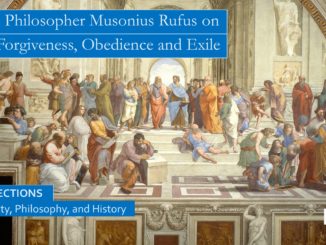
Rufus asks, like a good stoic, Why should the exile lament of his condition, why should he complain, how is he oppressed? Has he been exiled from the warmth of sun, has he been exiled from being refreshed by the rain, has he been excluded from the society of men? Rufus adds that in exile we may associate with our friends, our true friends, those friends “who would never betray or abandon us,” but those who shun us are not true friends, we are better off without those who are not truly friends. The most important question Rufus asks is, “How can exile be an obstacle to the . . . acquisition of virtue, when no one was ever hindered from the knowledge and practice of what is needful because of exile?” Rufus dismisses those who insist that exiles are the worse off when they also lose their freedom of speech. Nonsense, Rufus says, for you never truly lose your freedom of speech, for nobody can ever take away your freedom of thought, and if you do not feel free to speak out against injustice or impiety, you are not limited by lack of freedom, you are reined back by FEAR. To the truly courageous who insist on speaking out, the truly courageous who fear neither pain nor punishment nor death, how can they lose their freedom? They are truly free.
We must truly be thankful of all our fortunes and misfortunes, for neither keeps us from seeking virtue, and both can aid us in our journey towards greater virtue, towards salvation, towards the working out of our salvation, for what else does working out our salvation mean, if it does not mean that we work out our salvation through both our blessings and our sufferings? […]
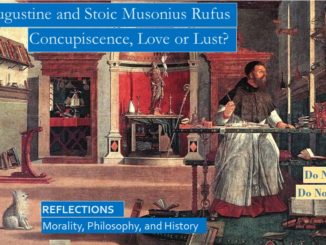
Many who denigrate St Augustine for his overly strict attitudes on intimacy and concupiscence do not realize that he was repeating what Stoic philosophers taught. Rufus is our best example, he criticizes “men who live luxuriously and desire a variety of sexual experiences, legitimate and illegitimate, with both women and men.” Then Rufus gives us advice that is very similar to the teachings of St Augustine: “men who are neither licentious nor wicked must consider only those intimate acts between husband and wife for the creation of children to be right and lawful, but intimate acts that chase after mere pleasure, even in marriage, to be wrong and unlawful.” What if nobody is hurt by these acts of pleasure? Rufus maintains “everyone who acts wrongly and unjustly, even if doesn’t hurt those near to him, immediately shows himself to be entirely base and dishonorable.” […]
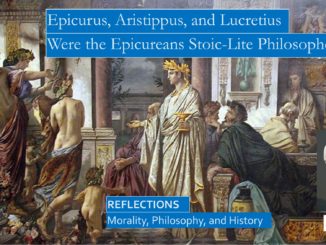
Epicurus would have been horrified by the sex, drugs, and rock and roll culture of the sixties. Baird and Kaufmann describe his beliefs thus: “Epicurus declares that pleasure is the highest good, though some pleasures are unnatural and unnecessary. In contrast to modern understanding of the word epicurean, Epicurus opposed exotic meals and profuse consumption. Such indulgences never bring permanent pleasure and frequently lead to its opposite: pain. Instead Epicurus advocates enjoying only the ‘natural’ pleasures – those most likely to lead to contentment and repose.” […]

When someone wrongs us, should we file suit, or should we forgive and forbear? Rufus explores this topic in his lecture on whether a philosopher should file a suit when assaulted. He tells us that “those who do not know what is really good and what is really shameful, and who are overly concerned with their own fame, these people think that they are being injured if someone glares at them, laughs at them, hits them, or mocks them. But a man who is thoughtful and sensible, as a philosopher should be, is disturbed by none of these things.” […]
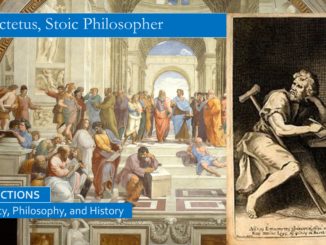
Epictetus tells us of someone who stole his lamp one night, he got the better end of the exchange. For Epictetus only lost his lamp, but he kept his faith. The man who stole his lamp, in exchange for the lamp he consented to become a thief, becoming faithless. […]

To Epictetus, only the good can be truly happy, only the good can truly be free, tyrants may take all you own, but they can never take your most prized possession, your freedom of will; tyrants can throw you in jail, but they can never take away the freedom of your mind; tyrants can take your life, but they can never have your soul. Epictetus, the great philosopher of freedom, was a former slave, a slave to a freed man, and was both poor and a cripple, eking out a living by teaching philosophy. Epictetus was not wealthy like Plato, and although Socrates was executed like Jesus, and is often compared to Jesus, Epictetus was closer to Jesus in social status, and like Jesus many of his teachings teach the common man how to live a godly life. Epictetus lived shortly before St Paul, close enough that it is doubtful they directly influenced each other, but like the Church Fathers Epictetus did not seek to teach original teachings, but rather repeated in his own distinctive fashion the teachings of the stoic philosophers who preceded him. […]
Copyright 2017